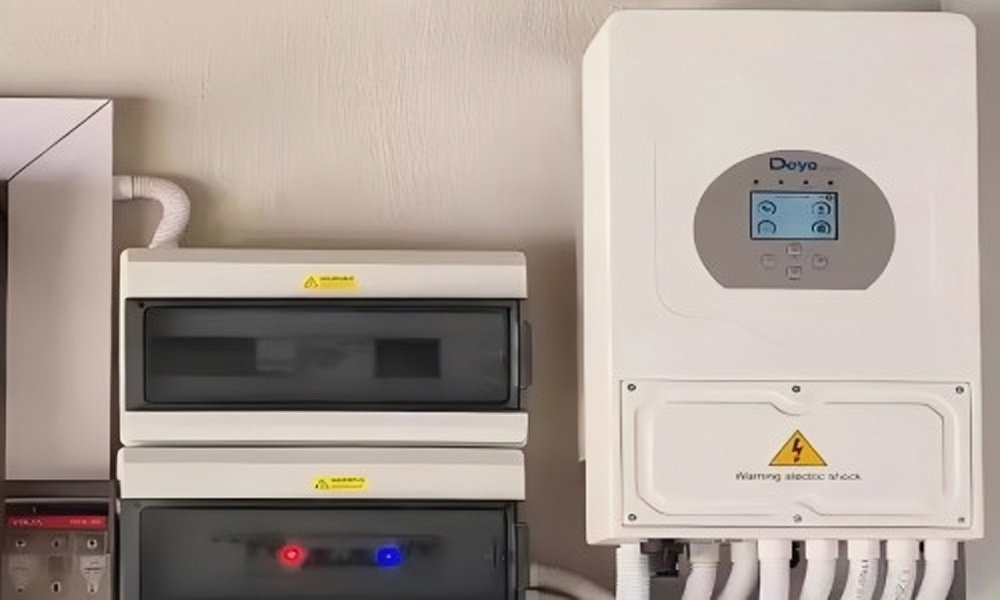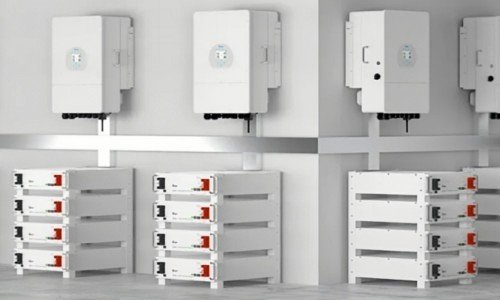
Instalacja falownika Deye
Choosing the right inverter for your solar system is crucial to optimizing performance and maximizing long-term savings. Deye and Solis are both well-respected brands in the solar inverter market, offering a range of options for residential and commercial applications. In this article, we will compare Deye and Solis inverters based on efficiency, cost and performance, performance in harsh conditions, and key features that set them apart.
Both Deye and Solis offer advanced technology, but which one provides better performance, value, and reliability for your solar system? Let’s explore.
How Does Deye Compare to Solis in Terms of Efficiency?
Efficiency is a critical factor when selecting an inverter. Higher efficiency means more solar energy is converted into usable power, improving the overall performance of your system.
Let’s compare the efficiency of Deye and Solis inverters to determine which brand delivers better energy conversion.

Komponenty falownika Deye
Deye vs Solis: Efficiency Comparison
| Model falownika | Deye SUN-3.6/5/6K-SG03LP1-EU | Solis 5G 5KW Inverter |
|---|---|---|
| Wydajność | 98.4%1 | 98.2%2 |
| Maksymalna moc wyjściowa | 6kW | 5kW |
| Maksymalne napięcie wejściowe | 600V | 600V |
| Zakres temperatur pracy | -25°C do +60°C | -25°C do +60°C |
| MPPT (śledzenie punktu mocy maksymalnej) | Podwójny MPPT | Podwójny MPPT |
-
Wydajność:
- Deye: Deye inverters offer an impressive efficiency of up to 98.4%, ensuring maximum energy conversion from solar power. This higher efficiency can result in greater energy savings and better system performance, especially for larger installations.
- Solis: Solis inverters also offer high efficiency, around 98.2%. While slightly lower than Deye’s, this is still a competitive efficiency rate, ensuring good performance for most residential and small commercial applications.
-
MPPT (śledzenie punktu mocy maksymalnej):
- Both Deye and Solis inverters feature dual MPPT, allowing them to maximize energy harvest from the solar panels, even when the sunlight is not uniform across the system. This feature helps improve overall system performance, especially for complex roof designs with shading.
Wnioski:
Deye slightly outperforms Solis in terms of efficiency, offering a 98.4% rate compared to Solis’ 98.2%. However, both brands offer excellent efficiency for most solar systems.
Which Offers Better Value: Deye or Solis for Cost and Performance?
Cost and performance are closely linked when choosing an inverter, as the initial investment should provide excellent value in terms of long-term energy savings. Let’s look at how Deye and Solis compare in terms of cost-effectiveness and overall performance.
Evaluating cost vs. performance is essential to understanding which inverter offers better value for your solar energy investment.
Deye vs Solis: Value Comparison
| Model falownika | Deye SUN-3.6/5/6K-SG03LP1-EU | Solis 5G 5KW Inverter |
|---|---|---|
| Cena początkowa | $1,200 - $1,5003 | $1,000 - $1,3004 |
| Wydajność | 98.4% | 98.2% |
| Gwarancja | 5-10 lat | 5 lat |
| Okres zwrotu | 5-6 lat | 4-5 lat |
| Roczne oszczędności energii | 4 000 - 6 000 kWh | 3 800 - 5 500 kWh |
-
Cena początkowa:
- Deye: Deye inverters are priced slightly higher, typically ranging from $1,200 to $1,500, reflecting their superior efficiency and robust performance.
- Solis: Solis inverters are more affordable, with initial prices ranging from $1,000 to $1,300. This makes Solis an attractive option for those looking for a budget-friendly inverter without sacrificing too much on efficiency.
-
Okres zwrotu:
- Deye: Deye inverters offer a payback period of around 5 to 6 years, thanks to their higher efficiency and long-term energy savings.
- Solis: Solis inverters offer a slightly shorter payback period of 4 to 5 years, which can be an advantage for homeowners or small businesses looking for faster returns on their investment.
Wnioski:
Solis offers a better initial price and a slightly faster payback period, making it a great choice for those with budget constraints. Deye, on the other hand, provides superior efficiency and a slightly longer payback period, which may result in greater long-term savings.
How Do Deye and Solis Inverters Perform in Harsh Conditions?
The environment in which your inverter operates can affect its performance and longevity. Extreme temperatures, humidity, and dust can all impact inverter efficiency, making it crucial to choose a model designed for the specific conditions where it will be installed.
Let’s compare how Deye and Solis inverters perform in harsh environmental conditions.

Konfiguracja systemu energii słonecznej
Deye vs Solis: Performance in Harsh Conditions
-
Odporność na temperaturę:
- Both Deye and Solis inverters are designed to operate in extreme temperatures, with an operating range of -25°C to +60°C. This wide range ensures that both inverters can perform reliably in areas with hot summers or cold winters.
-
Odporność na wilgoć i kurz:
- Deye: Stopień ochrony IP655 protects Deye inverters from dust and water ingress, making them suitable for outdoor installations in harsh conditions, such as coastal or desert environments.
- Solis: Solis inverters are also rated IP65, providing similar protection against dust and moisture. They are well-suited for outdoor use in mild to moderate environments but may require more frequent maintenance in extremely dusty or salty conditions.
-
Chłodzenie:
- Deye: Deye inverters feature advanced cooling systems that prevent overheating even during extended periods of high energy generation. This helps maintain performance and prolongs the lifespan of the inverter.
- Solis: Cooling systems6 in Solis inverters are effective but may not perform as efficiently in extremely hot climates compared to Deye’s more robust cooling design.
Wnioski:
Both Deye and Solis inverters are built to perform in harsh conditions, with IP65 ratings and a wide temperature range. However, Deye’s more advanced cooling system and higher efficiency make it a slightly better option for extreme environments.
What Key Features Set Deye and Solis Apart for Your Solar System?
While both Deye and Solis inverters offer great performance, they come with unique features that set them apart. Choosing the right inverter depends on your specific needs, such as system size, monitoring, and energy storage compatibility.
Let’s take a closer look at the key features that distinguish Deye and Solis inverters.

Panele słoneczne na dachu
Key Features of Deye and Solis
| Cecha | Deye SUN-3.6/5/6K-SG03LP1-EU | Solis 5G 5KW Inverter |
|---|---|---|
| Wydajność | 98.4% | 98.2% |
| Kompatybilność baterii | LiFePO4, LFP | LiFePO4, LFP |
| MPPT | Podwójny MPPT7 | Podwójny MPPT |
| Monitorowanie | Smart monitoring8 | Inteligentne monitorowanie za pośrednictwem platformy mobilnej/internetowej |
| Gwarancja | 5-10 lat | 5 lat |
| Integrated Storage | Yes (with compatible battery systems) | Yes (with compatible FusionSolar system) |
-
MPPT (śledzenie punktu mocy maksymalnej):
- Both Deye and Solis feature dual MPPT, allowing them to independently optimize the output of each string of solar panels. This is particularly useful for installations with shading or varying panel orientations.
-
Kompatybilność baterii:
- Both inverters support LiFePO4 and LFP battery systems, which are popular for their long lifespan and efficiency. However, Deye offers broader compatibility with third-party battery systems, while Solis works best with the FusionSolar system.
-
Inteligentne monitorowanie:
- Deye: Deye provides advanced monitoring features, allowing users to track performance via a mobile app or web interface in real-time. This feature helps users optimize their system and diagnose potential issues remotely.
- Solis: Solis also provides a smart monitoring platform, which is user-friendly and offers excellent insights into the system’s performance. However, it’s optimized for use with Solis’ FusionSolar platform.
Wnioski:
Deye and Solis offer similar features in terms of MPPT, battery compatibility, and smart monitoring, but Deye stands out with its broader compatibility with third-party systems and extended warranty options.
Wnioski
Choosing between Deye and Solis for your solar system ultimately depends on your specific needs and priorities. If you value higher efficiency, better performance in harsh conditions, and broader battery compatibility, Deye is the superior choice. However, if you’re looking for a more budget-friendly option with strong monitoring and a slightly shorter payback period, Solis is an excellent option.
Consider factors such as system size, environmental conditions, and budget to determine which inverter will best meet your long-term energy goals.
-
The Deye SUN-3.6/5/6K-SG03LP1-EU inverter offers up to 98.4% efficiency, ensuring maximum energy conversion and savings for large installations. ↩
-
The Solis 5G 5KW inverter provides 98.2% efficiency, making it a reliable choice for residential and small commercial solar systems. ↩
-
The Deye SUN-3.6/5/6K-SG03LP1-EU inverter balances high efficiency and performance with a higher initial cost, making it ideal for long-term savings. ↩
-
The Solis 5G 5KW inverter offers affordability and reliable performance, making it a cost-effective choice for smaller budgets. ↩
-
The Stopień ochrony IP65 ensures Deye inverters are protected from dust and water ingress, making them ideal for outdoor installations in harsh climates. ↩
-
Zaawansowany systemy chłodzenia prevent overheating and maintain inverter efficiency, especially in extreme heat, enhancing system longevity. ↩
-
Podwójny MPPT optimizes solar panel output by tracking the maximum power point for each string independently, ideal for installations with shading or different orientations. ↩
-
Smart monitoring provides real-time insights into system performance, helping users optimize energy use and diagnose issues remotely. ↩



